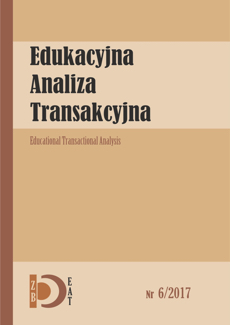Formalne i nieformalne doradztwo psychologiczne w kontekście edukacyjnym
- Autor
-
-
Piotr Jusik, mgr
International Community School w Londynie, Centro de Investigacion Cientifica y Cultural w San Pedro, Guatemala
-
- Słowa kluczowe:
- doradztwo psychologiczne, terapia formalna i nieformalna, role poradnicze
- Abstrakt
-
Artykuł oparty jest na teorii roli wg Schmida, która została zastosowana w celu rozróżnienia róledukacyjnych i poradniczych z perspektywy analityka transakcyjnego wspierającego osoby uczące się. Role edukacyjne rozpatrują rozwój osób uczących się jako proces nabywania umiejętności i wiedzy oparty na rozumieniu. Rolę poradniczą podkreśla natomiast rozwój osobisty wynikającyz doświadczeń relacyjnych oraz introspekcji. Ponadto, interwencje doradców psychologicznych mogą mieć charakter formalny lub nieformalny, związany z różnicami w kwestiach ról, kontraktu psychologicznego, poziomów pojemności i bezpieczeństwa emocjonalnego, a także poufności. Niniejszy artykuł przedstawia kilka użytecznych modeli z zakresu analizy transakcyjnej w kontek-ście formalnych i nieformalnych interwencji. Odpowiednie studia przypadku zostały zaprezento-wane w celu ilustracji zastosowania teorii w środowisku edukacyjnym. Według przemyśleń autora, solidne poradnictwo psychologiczne w analizie transakcyjnej wymaga świadomości składników roli psychologicznej, a także umiejętności zauważenia różnic pomiędzy rolami. Proponowane po-dejście umożliwia planowanie skutecznych interwencji, na których opiera się rozwój.
- Pobrania
-
Statystyki pobrań niedostępne.
- Biogram autora
- Pobrania
- Opublikowane
- 30.12.2017
- Numer
- Nr 6 (2017)
- Dział
- Analiza transakcyjna w edukacji
- Licencja
-
OŚWIADCZENIE AUTORA:
Mam świadomość, że czasopismo jest wydawane na licencji Creative Commons - Uznanie autorstwa (https://creativecommons.org/licenses/by/4.0/legalcode).
Przesyłając artykuł wyrażam zgodę na jego udostępnienie na tej licencji
Jak cytować
Podobne artykuły
- Beata Cytowska, Socio-psychological contexts of taking on the role of employee by adults with intellectual disabilities , Edukacyjna Analiza Transakcyjna: Nr 13 (2024)
- Jarosław Jagieła, dr hab. prof. UJD, Terapia Pisania Ról , Edukacyjna Analiza Transakcyjna: Nr 7 (2018)
- Tony White, Reflections on group psychotherapy , Edukacyjna Analiza Transakcyjna: Nr 13 (2024)
- Grażyna Cęcelek, Technologia informacyjna ważnym narzędziem współczesnego kształcenia ustawicznego , Edukacyjna Analiza Transakcyjna: Nr 9 (2020)
- Dorota Pankowska, dr hab., Analiza transakcyjna w edukacji czy edukacyjna analiza transakcyjna? , Edukacyjna Analiza Transakcyjna: Nr 1 (2012)
- Justyna Kasprzyczak, mgr, Psychologiczne znaki zauważenia „strouki” otrzymywane przez uczniów od nauczyciela a samoocena uczniów , Edukacyjna Analiza Transakcyjna: Nr 1 (2012)
- Anna Pierzchała, dr, Edukacyjna analiza transakcyjna a inne nurty pedagogiczne wyrosłe na gruncie koncepcji psychoterapeutycznych , Edukacyjna Analiza Transakcyjna: Nr 1 (2012)
- Włodzimierz Świątek, mgr, Rola psychoterapeuty w pracy z ofiarami i sprawcami przemocy szkolnej , Edukacyjna Analiza Transakcyjna: Nr 5 (2016)
- Michał Borda, ks. dr, Bożena Marzec, dr, Rola rodziny, nauczyciela i przedszkola w kształtowaniu postaw dzieci na podstawie badań ewaluacyjnych , Edukacyjna Analiza Transakcyjna: Nr 6 (2017)
- Włodzimierz Świątek, mgr, Lider w niewoli Trójkąta Dramatycznego , Edukacyjna Analiza Transakcyjna: Nr 4 (2015)
Możesz również Rozpocznij zaawansowane wyszukiwanie podobieństw dla tego artykułu.
Inne teksty tego samego autora
- Piotr Jusik, mgr, Głody rozpoznania, gry i uczenie się w grupach , Edukacyjna Analiza Transakcyjna: Nr 7 (2018)
- Piotr Jusik, Pasywność edukacyjna - od teorii do praktyki , Edukacyjna Analiza Transakcyjna: Nr 9 (2020)

